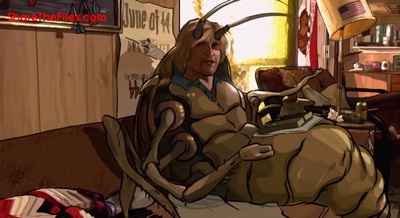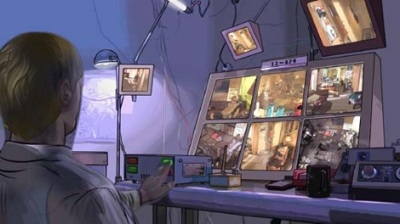Humanity’s Identity Crises
[Translations: French, Italian]
A major theme of this present century will be the pursuit of our collective identity. We are on a search for who we are. What does it mean to be a human? Can there be more than one kind of human? In fact, what exactly is a human?
On average science unveils a new invention every day, and almost without fail these days, that daily invention disrupts the notion of ourselves. Every day we are getting news that challenges our identity. Stem cell therapy, genetic sequencing, artificial intelligence, operational robots, new animal clones, trans-species hybrids, brain implants, memory enhancing drugs, limb prosthetics, social networks — each of these tools blurs the boundaries between us as individuals and among us as a species. Who are we and who do we want to be?

We get to play with answers to these questions online. In Second Life, or in chat rooms, we can chose who we want to be, our gender, our genetics, even our species. Technologies gives us the means to switch genders, inhabit new forms, modify our own bodies.
At the same moment, we have the rise of hyper-realities. These are simulations so complex, convincing, and coherent that they have their own reality force. A fake so good, it is sold and bought as a fabulous fake. A Disneyland so enticing, that it spawns its own “fakes.” There must be something there to fake. Or Photoshopped images so obviously unreal that they have their own reality. Synthetic materials more desirable than natural ones. Originals inferior to their reproductions. Who cares what is real and what is memorex?
These hyper-realities launch questions such as whether a assault in virtual space counts as an actual violent assault or mere virtual assault. How much of our real lives is mental? How much of reality is a consensual hallucination? Where do our minds end and outside begin? What if it — everything outside of us — is all mind?
The faster and greater our lives become mediated — the more time we spend communicating through technology — the more urgent this question of “what is real” becomes. How do we tell the difference, if any, between realities and simulations? How do these redefine humans?
I get much satisfaction from the free-thinking, nearly insane investigations by the legendary science fiction author Philip K. Dick. I am a big fan of Dick. His large body of work is now in ascendence because the two themes he nurtured are the two themes our culture will nurture in the next 100 years: What is a human and what is the nature of not-human, or reality.

Two images from A Scanner Darkly, adapted from Philip K. Dick.
In an amazing (and amazingly weird) address Dick gave in 1978, he lays out his themes:
The two basic topics which fascinate me are “What is reality?” and “What constitutes the authentic human being?” Over the twenty-seven years in which I have published novels and stories I have investigated these two interrelated topics over and over again. I consider them important topics. What are we? What is it which surrounds us, that we call the not-me, or the empirical or phenomenal world?
Dick’s themes are becoming our themes. The question of “Who are we?,” “What is reality?” will move from the edges of science fiction and into the center of our culture. I can imagine these questions occupying the front seat of our societal consciousness. The question of human identity will be the headlined in USA TODAY and CNN. They will be addressed by Supreme Court. They will be the topic of dinner conversations.
In a few decades when the realities the Dick only dreamed of become concrete, when we have daily experience with better AI, with grown up genetically modified babies, with mind enhancement drugs that work, with routine virtual realities, with always-on social hive minds, the conundrums that Dick wrestled with will be our conundrums. Think The Matrix, but on the 11 o’clock news. There will be senators and business men and solid Republicans saying, ” Dude, what if reality is really another level? What if being a human is a choice?”
We can expect great uncertainty about our species identity and the nature of what we should count as real. It will be an anxious time. This deep anxiety and uncertainty will breed many weird cults and strange beliefs — as it did within Philip K. Dick (just read that address!). There will be psychosis and wars built on the uncertainty of what is a human. The abortion war and the war over slavery are only two hints of the degree to which this question can provoke mortal conflict.
Yet even those who escape the violence — the mass of ordinary citizens and net surfers — will be pressed by a blanket of unresolved doubt. Who am I? Can there be more than one species of human? Can a robot be a child of God? Is slavery among intelligent machines acceptable? Should we extend the circle of empathy beyond animals and living things to made things? If it hurts, is it real?
You know how it is when a friend gets consumed by these unanswerable questions? They may flip out, or become paralyzed by the unrelenting weight. Now image a whole world waylaid by these Dickian obsessions. An entire species afflicted with an identity crises. It’s coming.


